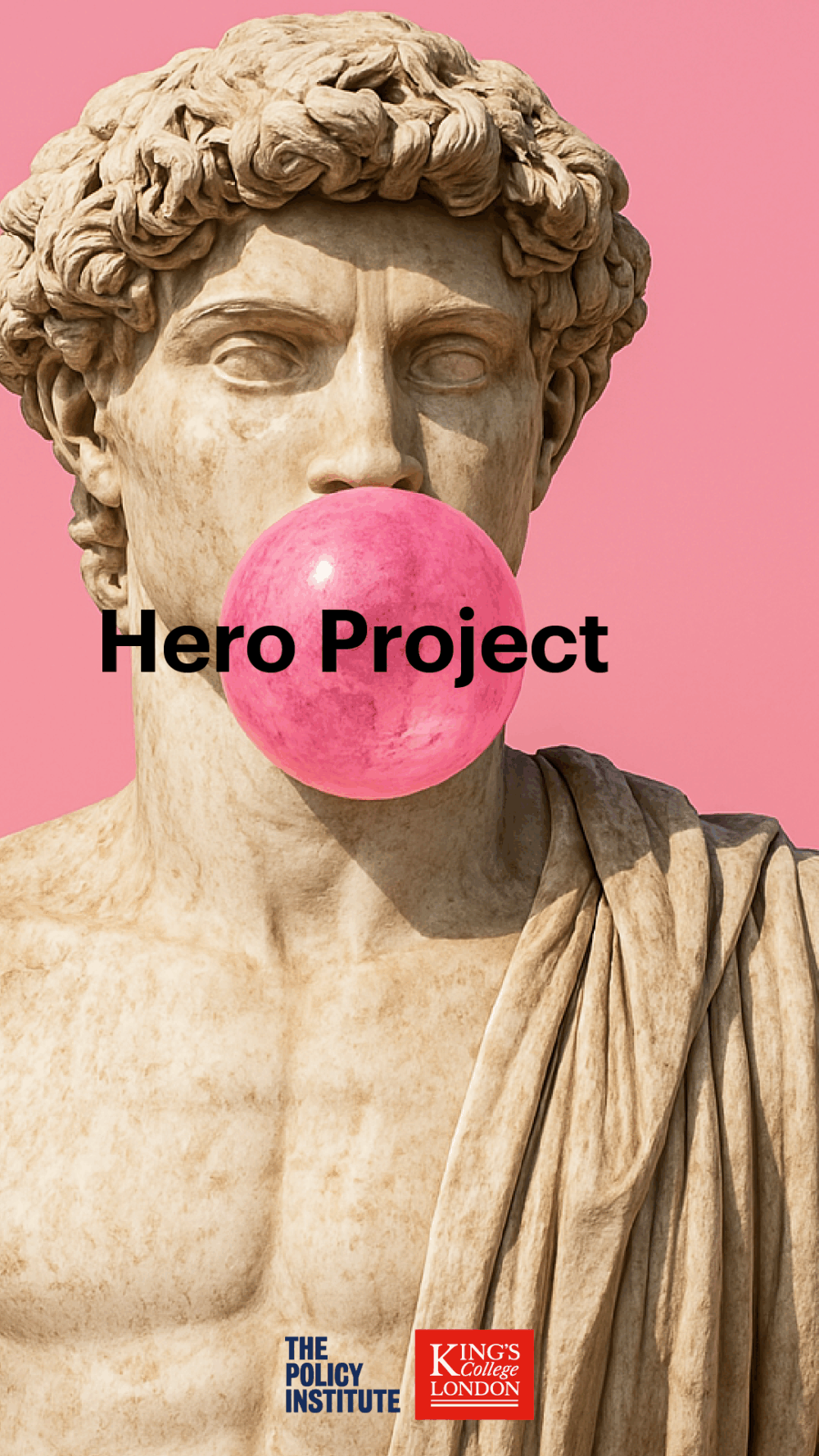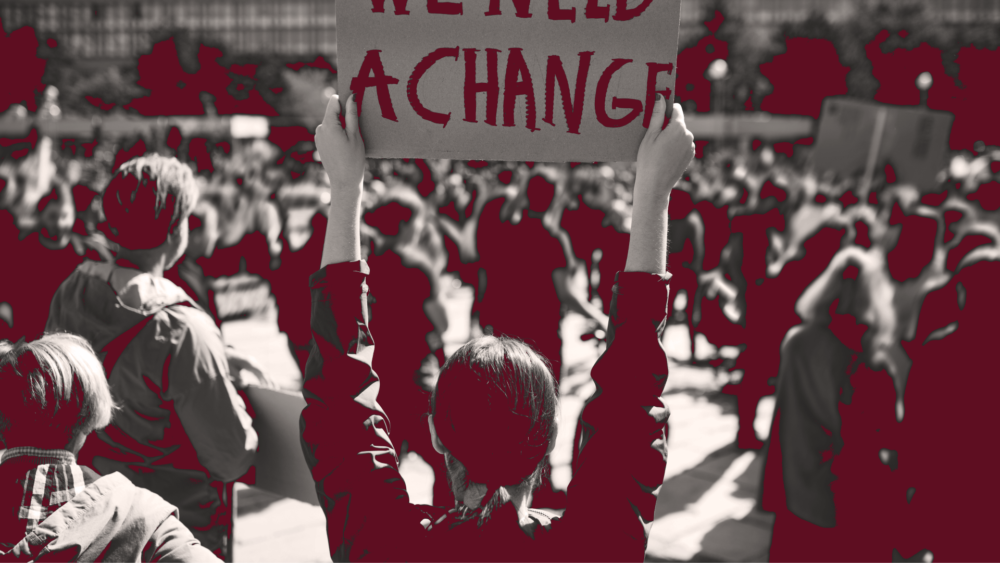
A society of contradictions seeking a fairer future
The present research was conducted for Eteron by aboutpeople PLC in December 2021. The total sample consisted of 1659 people over 17 years old, 1220 of which participated in online interviews and 439 were interviewed over the phone by the Surveys Unit of the University of Macedonia.
This research program is an effort to create a map of Greek society and covers a very broad array of topics: the State, institutions, values, justice, the public sector and mainly the economy are its main focus points. Our goal was to not run a typical survey that would depict the impact of a specific moment in time, but rather to try and acquire a deeper and more extensive understanding of the values and opinions of the participants regarding the topics above. This is why we included 130 variables, since their analysis allows us to better understand how citizens think.
Personal circumstances: Finances are a satisfaction factor
Almost 6 out of 10 participants state that they are satisfied with their lives, while 42.5% feel differently. The least satisfied groups are those who place themselves in the working and lower-middle classes, the unemployed and those who earn up to 500 Euros per month. When asked about their personal finances, the numbers reverse. Now it’s 42.2% of the participants who feel very or somewhat satisfied, while 57.3% are very or somewhat unsatisfied.
Democracy: Clear demand for operations’ improvement
Satisfaction regarding the way Democracy works in Greece is measured only at 28.2%, while 70.6% say they’re unsatisfied. The least satisfied groups are people who place themselves in the working and lower-middle classes, the unemployed, students, those who earn up to 500 Euros per month, those who aren’t University graduates and those who place themselves in the left of the Left-Right axis.
It is worth mentioning that 81.7% of the participants believe that the people’s demands are being ignored in favour of the status quo’s interests, while 76.9% think that democracy in Greece would be more efficient if citizens participated more, via people’s’ assemblees and referendums. There’s also a 14.7% who think that on certain occasions, a dictatorship could be better than democracy.
Values: Conservative, Progressive, something in between?
Over 7 out of 10 participants believe that the distinction between progressiveness and conservativeness is still significant in the present day and age. 63.2% estimates that Greece can’t accept any more foreigners, while almost half of the people (47.5%) believe that Islam constitutes a threat towards our culture and the country’s values.
For 53.8%, religion is important in their lives, while 44.6% say the opposite. Opinions in favour of adoption by homosexual couples are minoritarian but still significant (44.6%) as are those in favour of the legalisation of ‘soft’ drugs (35.6%).
Institutions: In search of trust
None of the institutions we included managed to gather more than 50% of the citizens’ trust. The top three on the list are the Police (47.1%), the government (45.8%) and the Prime Minister (45.7%), followed by Justice (43.5%) and the Parliament (42.7%). Last on the list are the media (10.7%), employers’ unions (13.4%), NGOs (15.8%), trade unions (17.6%) and political parties (16.3%). It is worth noting that Public Administration gathers a low score amongst citizens, as do its separate sectors such as the Internal Revenue System (Tax Office) (26%), the Labour Inspectorate (30.2%) and the Single Social Security Entity (ΕFKA) (31.8%). Even the Church gathers a lower rate than I personally expected, at just 32.1%.
European Union: Yes, but under certain circumstances
Even though 38.3% of the citizens trust the E.U. and 59.7% do not, the overall assessment of Greece’s participation in the E.U. is positive for 67% of the population, and negative for 30.2%, while 61.4% believe that the E.U. is something good and 28.6% think it’s something bad. At the same time, 69.8% of the people want Greece to remain in the Eurozone, while 21.8% would prefer to return to the former currency, the drachma. The least satisfied groups regarding the E.U. are the unemployed, farmers, those who place themselves in the “working class”, the low-income earners and citizens who place themselves in the Left.
Healthcare: 4 out of 10 find it difficult to pay for medication, tests and hospitalisation
This research was conducted during a time when the pandemic was the main issue that concerned all citizens, and therefore, the questions that regard healthcare have great significance. 88.1% of the participants believe that the National Healthcare Service’s budget should increase.
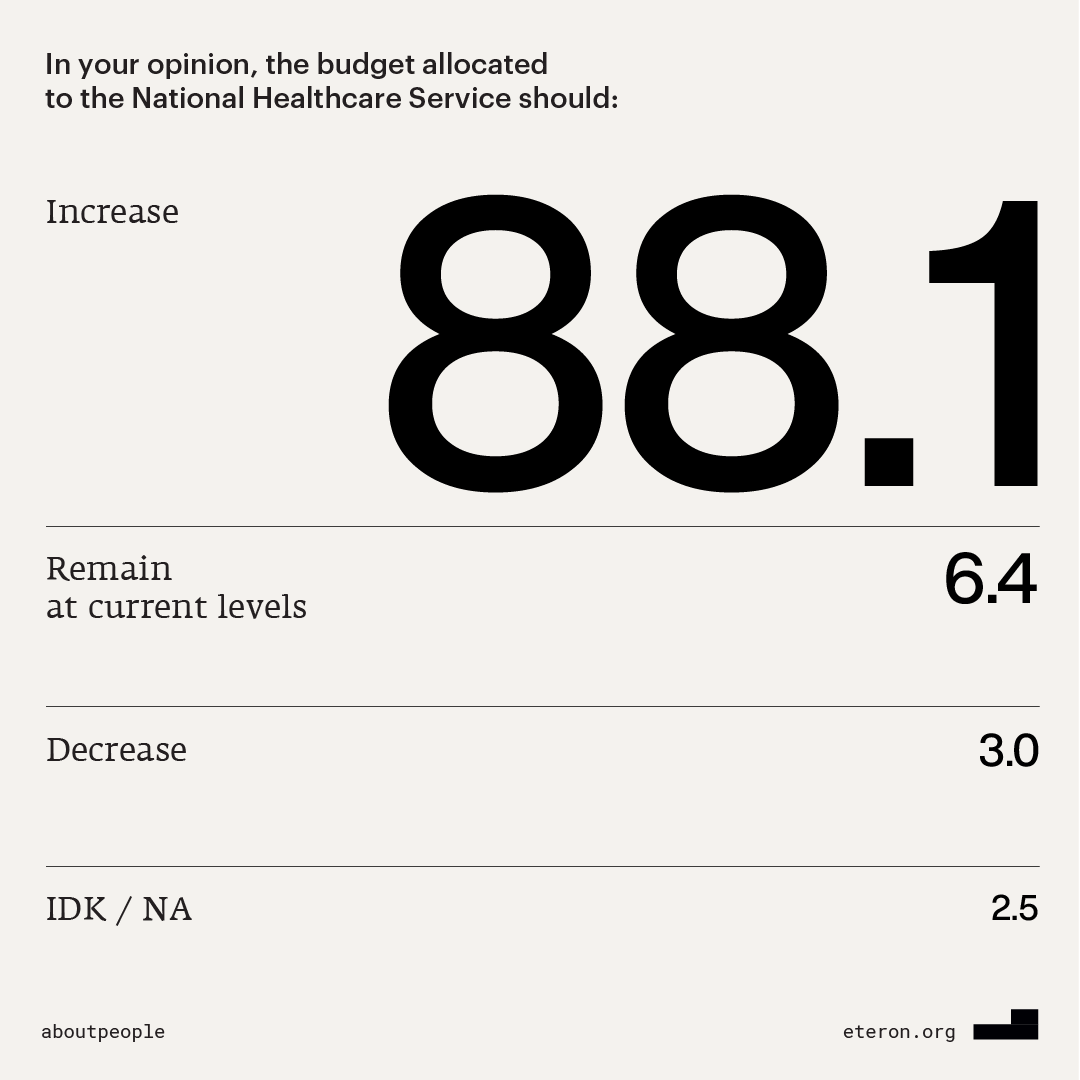
The citizens’ immediate priorities in terms of issues that should be addressed are: a) the insufficiency of infrastructure in public hospitals (51.1%), b) the lack of doctors and nurses in public hospitals (45.6%), c) the absence of organised primary healthcare services on a local level, d) the fact that the poor do not have access to the same level of healthcare as the rich (28%) and e) the extremely high costs that patients have to pay for health services in the private sector (26.4%). At the same time, 58.2% say that they’re able to afford the cost for healthcare related issues, while 4 out of 10 claim the opposite.
Politics and ideology: A society of contradictions with a progressive charge
One of the most interesting parts of this research is the evaluation of certain words that are relevant to politics and ideology as positive or negative. The findings are contradictory in certain parts, but finally they compose the general profile of the average citizen. So, for example, while “competitiveness” gathers a positive score of 71.9%, and “market economy” is positively rated by 55.9%, on the other hand “privatisations” are viewed as something positive only by 36.4%, “neoliberalism” by 30.7% and “capitalism” by 24.1%. On the domain of purely political terms, the “Centre” gathered positive votes by 61.8% of the population, the “Left” scored 39.4%, the “Right” 25.7%, the “Radical Left” 20.3%, the “Far-Right” 4.2%, while “Socialism” gathered 59.1%, “Social-democracy” 52.1%, “Liberalism” 46.2%, “Capitalism” 24.1% and “Communism” 19.2%. The top three of that list are “Ecology” scoring 82.4%, “Competitiveness” with 71.9% and “Social Movements” at 63.3%, while the bottom three are the “Far-right” with 4.2%, “Populism” with 8.5% and “Nationalism” that scored 17.9%
The majority trust the Centre-left and the Left to promote the decrease of economic inequalities (42.8% CL – 17.7% CR), a fair pensions’ system (37.9% CL – 20% CR), tax justice (35.3% CL – 19.8% CR), the efficiency of the public sector (32.4% CL – 26.9% CR) and the decrease of the government gross debt (28.6% CL – 26.6% CR). On the other hand, more people trust the Centre-right and the Right to promote the competitiveness of Greek companies (36.8% CR – 22.1% CL) and to support new businesses (31% CR – 29.3% CL). The above are in line with the 2019 election results, when we had a majority for the non-right-wing political parties, as noted by Gerasimos Moschonas at the aboutpeople seminar “N.D., SYRIZA: Competition, Identity, Prospects” in April 2021. It is worth noting that in every question, at least 3 out of 10 participants state that they do not trust neither the Centre-left/ Left nor the Centre-right/ Right.
Who produces wealth? Is wealth distributed fairly?
Society’s opinion seems to be split in a three-way tie when it comes to the question of which social group produces wealth: 36.4% believe that it’s mostly the business owners, 29.7% state that it’s mostly the workers and 31.8% think that the two groups contribute equally. The age groups, class self-placement and political self-placement of the participants is differentiated in this case. Yet, the citizens’ opinion is rather emphatic on whether the wealth is distributed fairly between the business owners and the workers, as 84.7% believe that the business owners are getting an unfair lion’s share, leaving the workers with next to nothing.
State support for small and medium-sized enterprises
The majority of the citizens (69.4%) believe that the State should mainly support small and medium-sized enterprises because they’re the backbone of the Greek family, while 4% think that the State should rather support big businesses so that they can “grow bigger and find a place in global markets” and 22.7% state that the State should support neither one of those, and instead it ought to support the workers. At the same time, 8 out of 10 participants (81%) believe that the right to strike is sacred.
State or markets? Towards a social-liberal economy
52.7% prefer an economic system that’s mostly based on the free market, while 33.3% are in favour of a system that is mostly based on central planning. The above statement is supported by the “demand” of 78.9% of the participants for a decrease in taxation in order to boost businesses so they can hire more workers and decrease unemployment. On the other hand, 15.4% would rather see taxes rise in order to improve the level of public services, increase state welfare and reduce inequalities, while there’s a 43.7% that believe that taxation should be low, even if there is less state welfare and 38.4% believe that taxation should be higher so we can have a strong welfare state that is able to support all the people. At the same time, 44.8% think that the State does not intervene enough, allowing the private sector to act with impunity, while 41% claim that the State intervenes too much, thus preventing the private sector from creating wealth and jobs. When asked what kind of State/ public sector the country needs, 39.6% think it should improve without growing or shrinking, 33.6% would prefer a more limited State and 19.6% would opt for a larger State.
Basic goods and services: Mainly a State’s responsibility
Education (90.2%), healthcare (87.8%), pensions (86.1%), the water supply (84.2%), energy (69.5%), land transport (69.2%) and the banking system (51.6%) should fall primarily under the responsibility of the public sector.
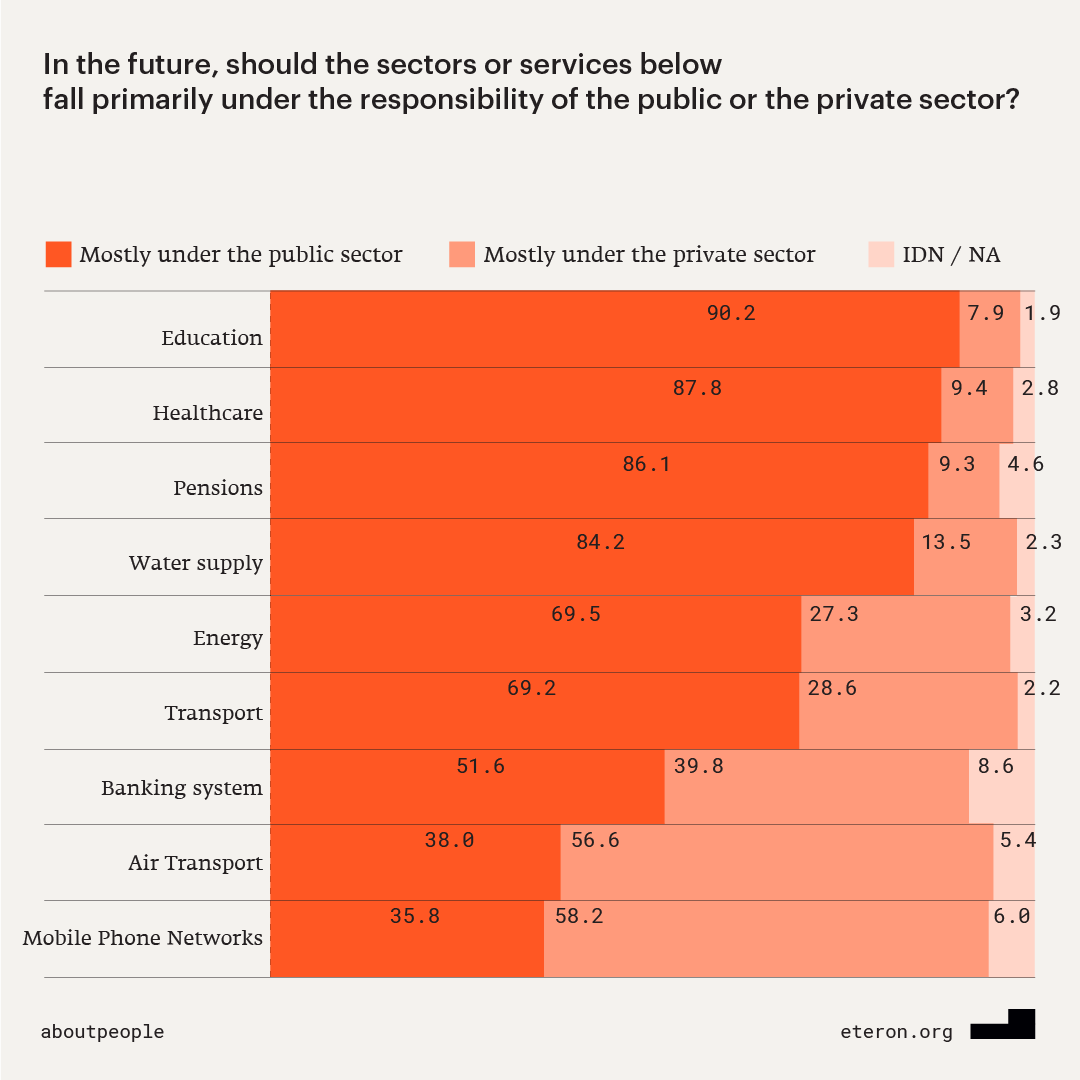
The key-word in this question being “primarily” and the participants’ answers show that even though they are for a market economy, they believe that a series of basic goods and services should also receive the State’s support. We can tell that “primarily” is a key-word, as when it comes to Education, 49.2% agrees with the founding of non-state universities, while 46.7% disagrees.
A strong anti-neoliberal approach in theory…
71.1% would rather see people collaborating more in the future and hope for more solidarity within society, while 24% would like a boost in individual efforts, citizens’ autonomy and less dependency from the State. At the same time, 53.3% think that personal freedom entails freedom from poverty, strong social protection and a State that limits the markets’ role, while 35.6% think that personal freedom requires free markets, private initiatives and a State that intervenes as little as possible in the economy. A significant finding is that 62.5% believe that economic inequalities aren’t connected to human nature, but to the economic and political system that causes them, while 28.5% think that economic inequalities are something normal, because this is how human nature works. Finally, regarding employment patterns, 62.7% of the participants believe that flexible forms of employment hurt the economy, because they create a feeling of insecurity among workers who consume less as a result.
…but practically we follow a rather mixed approach
While the trend is clearly anti-neoliberal in the answers we received to the “theoretical” questions mentioned above, when the questions turned more practical, lines kind of blurred. Indicatively, 88.5% believe that the salaried employees and the pensioners carry a greater tax burden, 83.7% believe that “talks about equality are nice, but people who try harder should be compensated more”, 83.2% believe there should be tax-increases on the rich in order to the support the more vulnerable and 63.4% believe it’s not fair for the middle-class to pay solidarity benefits for the poor. It is worth mentioning that while 61.8% believe that the State should increase the duration and the amount paid for unemployment benefits, there’s a 50.6% that think that “When the state provides numerous benefits, it teaches its citizens not to make an effort” and a 45.1% who claim that unemployed people could find a job if they really wanted to. So, the conclusion is that while the participants’ answers are very clear when it comes to theoretical matters, when asked about tangible issues, their positions are rather fixed and contradictory.
Demanding a more efficient Public Sector – Civil servants are a privileged group
3 out of 4 participants believe that the Public Sector can become more efficient, while 21.9% believe that this is impossible due to its nature. At the same time, 63.4% state that a possible abolishment of the civil servants’ tenure would help improve the quality of the Public Sector’s services and 66.2% believe that the civil servants are a privileged group because they have secured employment and receive high salaries. It is worth noting that the only group that disagrees with the statements above are civil servants themselves.
Young people, the group with the most losses during the financial crisis
The groups that suffered the biggest losses during the recent financial crisis are young people (60.1%), people working in the private sector (48.7%), pensioners (46.4%) and small and medium-sized business owners (40.3%). Other affected groups are the unemployed (22.9%), people working in the public sector (17.3%), freelancers (lawyers, doctors, plumbers etc) (12.9%), farmers (11.7%) and big business owners (3.3%)
Greece, an unfair country
68.3% of participants believe that inequalities in Greece are currently increasing, while 22.2% believe that they’re neither increasing nor decreasing and 6.5% think that inequalities are currently decreasing. The vast majority believes that Greece is more unfair as a country compared to others.
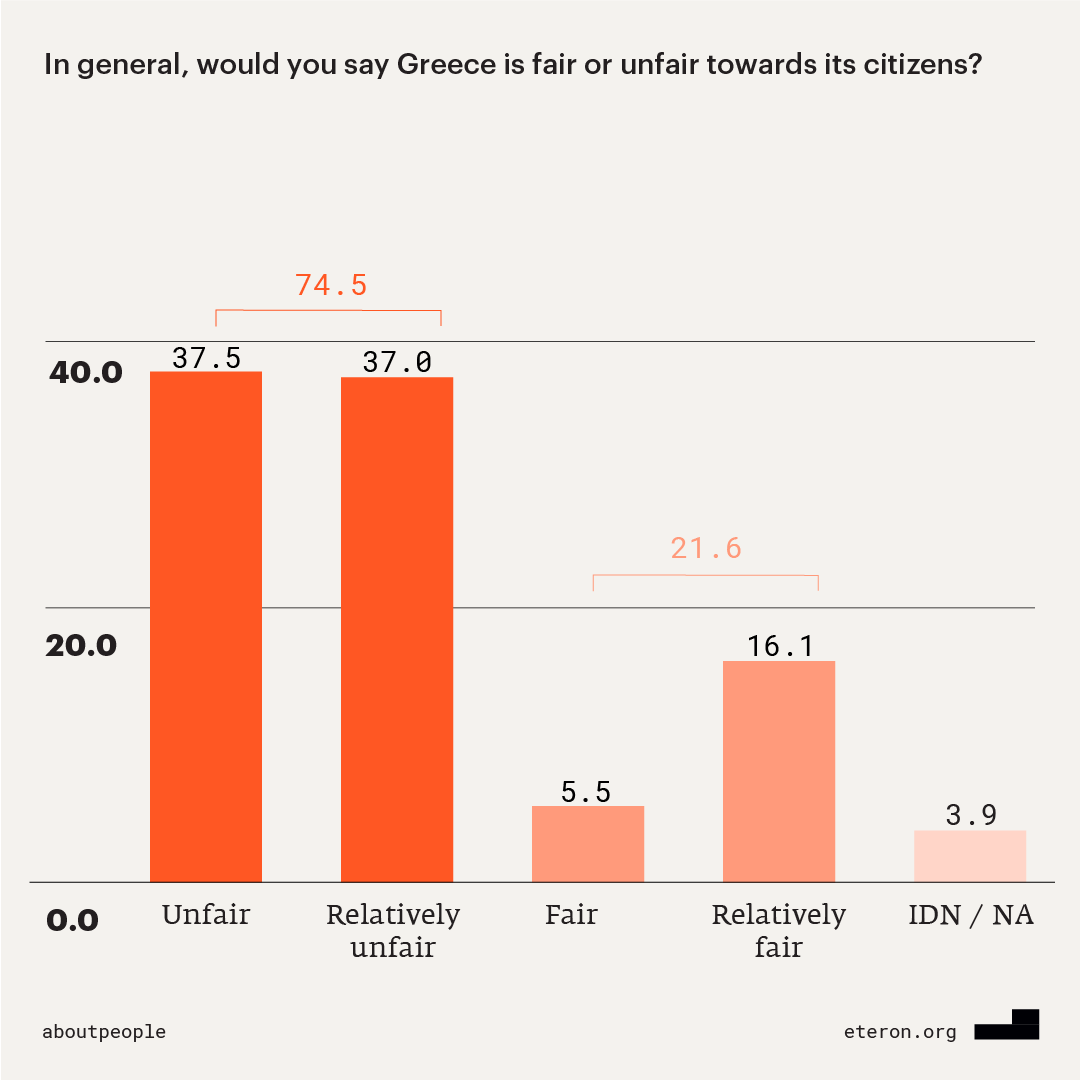
The top-five of inequalities are: 1) that there are employees that can’t sufficiently provide for themselves and their families with the salary they earn (41.3%), 2) that is no meritocracy (36.4%), 3) that those who have political party connections have better prospects than those who don’t (30.2%), 4) that immigrants have access to state benefits while poor Greeks do not (30.1%), 5) that some people pay taxes while others pay little to no taxes (29.8%) and that young people can’t find work (29.8%). Those are followed by the extremely low pensions that pensioners receive (27.9%) and the fact that among civil servants, those who work a lot get paid the same as those who hardly work at all.
Instead of an epilogue
Eteron conducted an extended and in-depth research, aiming to explore the citizens’ opinion on a variety of topics, mainly focusing on the economy. Even though the current research took place during a period when the pandemic was on the rise again, we tried to ask questions that were beyond the pandemic issue and that would allow us to form a more solid and overall understanding of Greek society. Still, we can’t overlook the fact that especially in certain questions, the pandemic has left its traces and it’s probably the reason behind the trend towards an extended role of the State.
The conclusion reached after looking into the research, is that Greek society is a society of contradictions, in search of a fairer future. A society where progressive and conservative, neoliberal and anti-neoliberal viewpoints coexist. It is a society, though, that, with its contradictions, has a distinctive strong pragmatism and -in a way- a unique cynicism. It isn’t dogmatic and it searches for a mix of policies -no matter their ideological origins- that would, in the citizens’ opinion, improve people’s individual living conditions and at the same time would respond to the demand for a fairer country.

